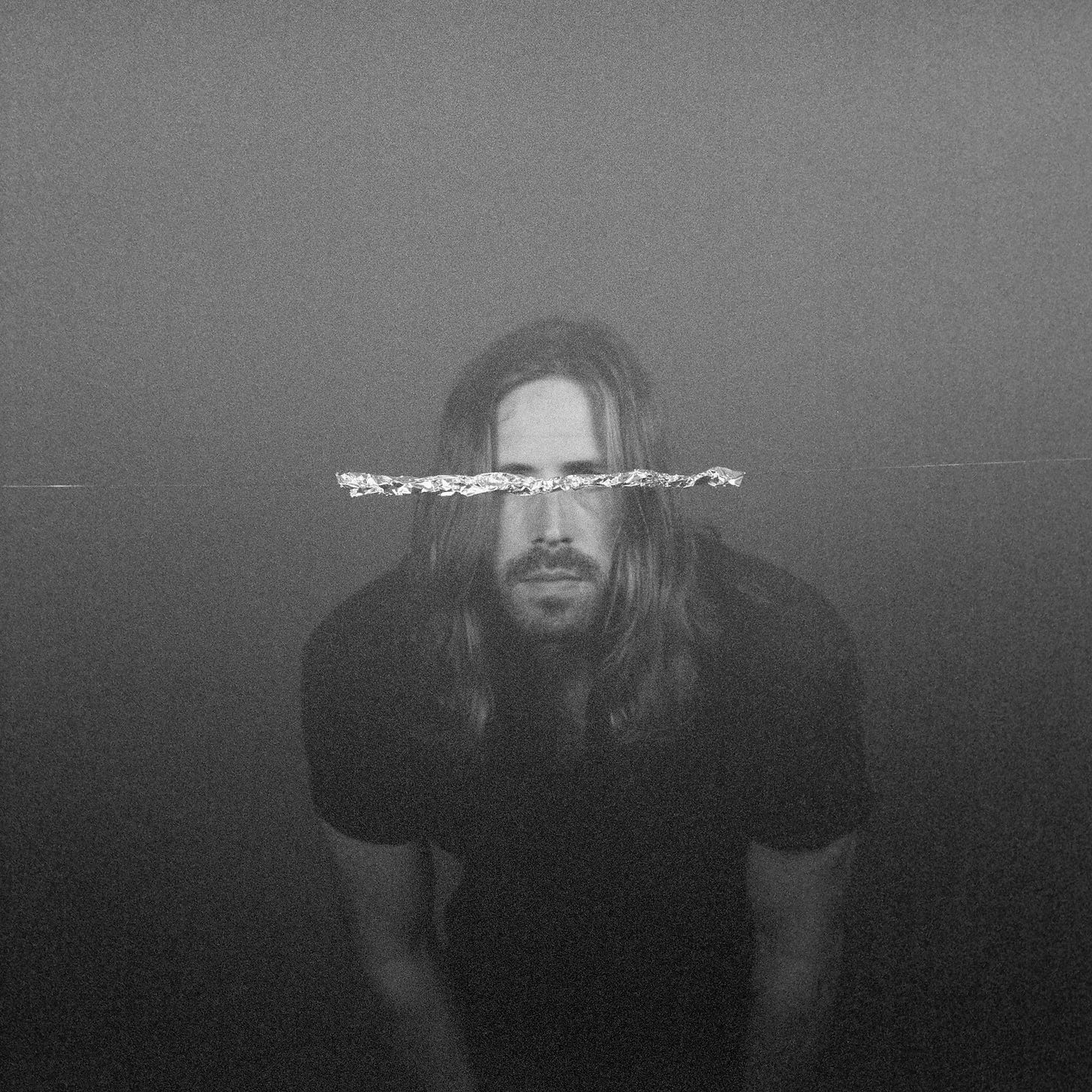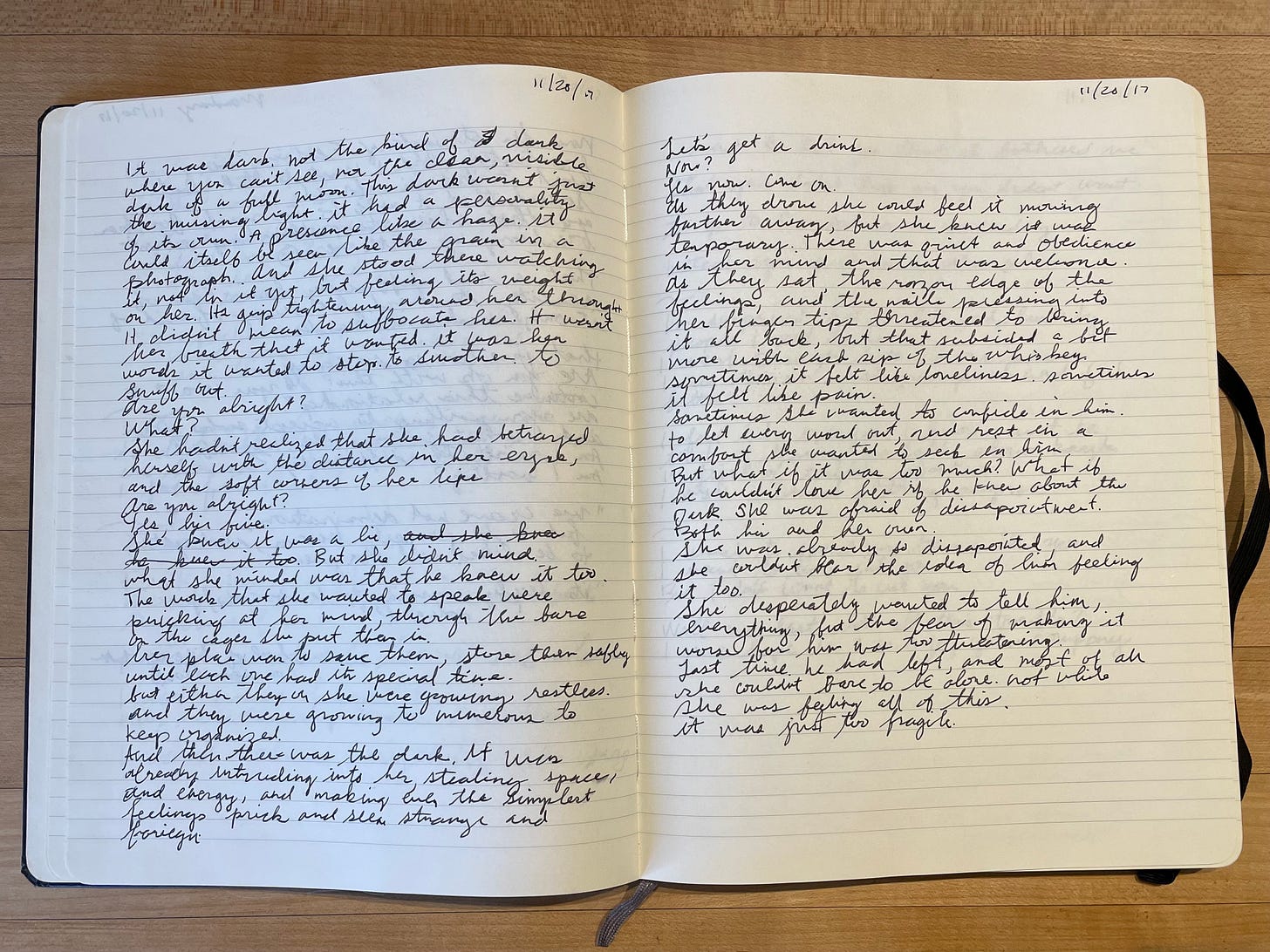The Dark
A vignette
It was dark. Not the kind of dark where you can’t see, nor the clear invisible dark of a full moon. This dark wasn’t just the missing light. It had a personality of its own. A presence like a haze. It could itself be seen like the grain in a photograph. And she stood there watching it, not in it yet, but feeling it’s weight move to her. It’s grip tightening around her. Though it didn’t mean to suffocate her. It wasn’t her breath that it wanted. It was her words it wanted to stop. To smother. To snuff out.
Are you alright?
What?
She hadn’t realized that she had betrayed herself with the distance in her eyes, and the soft corners of her lips.
Are you alright?
Yes, I’m fine.
She knew it was a lie. But she didn’t mind. What she minded was that he knew it too. The words that she wanted to speak were pricking at her mind, reaching between the bars of the cages she kept them in.
Her plan was to save them, store them safely until each one had its special time. But either she or they were growing restless. And they were growing too numerous to keep organized.
And then there was the Dark. It was already intruding into her, stealing space, and energy, and making even the simplest feelings prick more and seem strange and out of place.
Let’s get a drink.
Now?
Yes, now. Come on.
As they drove she could feel it moving further away, but she knew that was temporary. There was quiet and obedience in her mind and that was welcome. As they sat, the razor edge of the feelings, and the nails pressing into her finger tips threatened to bring it all back, but that subsided a bit more with each sip of the whiskey.
Sometimes it felt like loneliness, sometimes it felt like pain.
Sometimes she wanted to confide in him. To let every word out, and rest in a comfort she wanted to seek in him. But what if it was too much? What if he couldn’t love her if he knew about the Dark? She was afraid of disappointment. Both his and her own.
She was already so disappointed, and she couldn’t bare the idea of him feeling it too.
She desperately wanted to tell him everything, but the fear of making it worse for him was too threatening.
Last time he had left, and most of all she couldn’t bare to be alone. Not while she was feeling all of this. It was just too fragile.
I wrote “The Dark” sometime in 2017, sitting alone at a picnic table at a dive bar near my house. It was shortly after my divorce, on a night when my kids were with their mom, and I was still learning how to be alone. I was seeing a girl at the time, but things with her were still nascent. I had wanted to be with her that night, but she was still trying to enforce a sense of space between us. So I took my journal, ordered a beer, and sat and wrote. Somehow this story bled from the tip of my pen, word for word. I didn’t try to write it, I didn’t have the idea. I simply wrote, and now these words exist.
I wonder what I looked like sitting there that night. A woman nearby tried to strike a conversation with me, and complimented my handwriting. Looking back at my journal, the handwriting was terrible. I suspect she wanted my attention, but I wasn’t interested in giving to her. My mind was on another, and at least temporarily engaged in a story that had begun to pull something out of me. I didn’t want to be interrupted.
Inspiration is a strange affair. You can say that it calls to you, and you respond. Equally you can describe it as something that wants to get out, and you must open the lock and release it. Is it internal or external? The truly intoxicating and cathartic nature of the creative act is that it is both at the same time, and there is a sense of whole that alights when you find yourself in it. I don’t know how to make it happen, I only know in some immature way how to sense it coming, and sit myself down and listen, and try to wrestle with it.
This vignette has sat in my notes, and periodically called back to me, suggesting that it has some importance or some meaning. I call it a vignette, rather than a short-story because it seems to me a snap shot of a feeling, or an idea. Some whom I’ve shared it with have suggested I develop it. They want to know more about the woman. I do too. But how can you know when something is finished? Why does a poem not become a play, or a song not become a musical? Why does a photograph not become a film? Why does a journal not become a memoir? The line of inspiration, once cast, sometimes does not return. It catches, and then releases, leaving you with some artifact that you don’t understand. Like a river stone you hold it in your hand, turning it over, exploring its texture, wondering, is it complete?
You can’t know. In fact, completeness it isn’t a known, or even a natural state, it’s a decision. It is only we, the conscious ones, who are even concerned with concepts like completeness. Us minor gods trying in vain to discern what is good. All the best of us can do is offer up a sacrifice, and see what it does to the world.
So I offer you this vignette, this look into a thought, this artifact of a warm night at a dive bar. Perhaps it’s not finished. But perhaps that’s appropriate, for neither am I. And the woman in the story is me.




This vignette is raw and transparent. I like your physical details, "she betrayed herself with the distance in her eyes, and the soft corners of her lips" and "the razor edge of the feelings, and the nails pressing into her finger tips" let me see and feel. It felt like the ending was being made aware that you were the she. Did not see that coming and it was good!
This is curious. I’ve always thought of writing as grabbing the third rail. You grab it and push as much truth as you can into your writing and hope for the best. Sometimes it comes out in interpretable prose. Sometimes, a complete garble. But I’ve never thought of it differently. It’s interesting, every writer seems to have a different perspective. CS Lewis described writing about Narnia as a complete discovery. As if he was writing something that was being revealed to him. It’s just curious how different writers describe the inspiration experience.